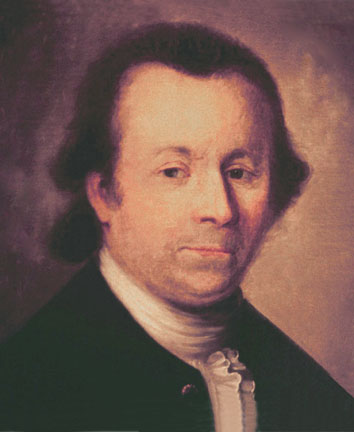Maybe you’ve heard of Gwinnett County, a fast-growing suburb of Atlanta where about a million people live. If you live on the other side of Georgia, in Savannah, you’ve been on Gwinnett Street, a busy east-west four-lane road. In fact, a lot of things in Georgia — everything from schools to industrial centers — are called Gwinnett, named for English-born Button Gwinnett, one of three Georgians who signed the Declaration of Independence.
Because he signed the Declaration — and for that reason alone — Gwinnett is on every list of America’s Founding Fathers. Upon reading that, you’re probably OK with him receiving that honorable designation. In fact, I may be the only living person who has a problem with Gwinnett being called a Founding Father. Why?
I’ve begun writing a book about Gwinnett — Button Gwinnett: America’s Accidental Founding Father — and found that he is undeserving of that title. Of the 56 men who signed the Declaration, 52 thought 1776 was the right year for America to seek its independence from England, three thought 1776 was too early, and one, Gwinnett, couldn’t care less.
There’s no evidence that he attended even one pro-independence meeting before he signed the Declaration. In the lead up to America declaring his independence, he never participated in battles against the British army or navy. He never expressed a pro-independence sentiment that anyone ever recorded until 1777. In fact, in the spring of 1776, in the weeks before our nation’s leaders were preparing to declare our independence, Gwinnett, who was in debt, wanted to lead a state militia because he wanted the salary that came with the job. Never mind that he had no military experience. To be fair, experience wasn’t always a prerequisite for a military leadership position in the 18th century.
However, Georgia’s leaders gave the job to a man with many years of military experience. To appease Gwinnett, he was given the opportunity to represent Georgia in the Second Continental Congress, which would be meeting in Philadelphia. He received that opportunity because he was good friends with Lyman Hall, a Yale-educated clergyman, doctor and planter who was at the center of the independence movement in Georgia. Georgia, which sent a British loyalist to represent it in Congress in 1775, wanted to be thought of as a pro-independence state, and Hall, who was a congressional delegate, knew that Gwinnett, who was politically apathetic, would vote for independence if Hall wanted him to do it.
So Gwinnett went to Philadelphia with Hall and voted for independence on July 2, 1776, approved the Declaration of Independence on July 4, and signed it on August 2. The day he signed it — the first name in the left-hand column — Gwinnett left Philadelphia after serving only 10 weeks in Congress. He reached Savannah on August 30 and took credit for Congress giving Georgia money for its defense. Congress’ meetings, starting in 1774, were well chronicled, and there is no evidence that Gwinnett played any role in Georgia receiving that money. In fact, Georgian George Walton spoke at length on the subject. What’s more, Georgia Gov. Archibald Bulloch made it clear that Georgia needed that money, and John Adams respected and admired Bulloch, so Georgia was likely to receive the money even if Walton said nothing.
Gwinnett became something of a hero in Georgia and was elected to the state Legislature, and he volunteered to oversee the creation of the state’s first constitution. It borrowed heavily from other documents, but historians (and I) give Gwinnett credit for what is widely believed to be a well-done state constitution. After Bulloch died suddenly and mysteriously, Georgia’s leaders anointed Gwinnett the state’s interim governor for what amounted to two months. Some of Gwinnett’s contemporaries, including George Walton, said he became power hungry. After he was publicly insulted by an army general, he challenged the general to a duel, which took place in a cow pasture just east of Savannah on the morning of May 16, 1777.
Gwinnett was shot in the leg, as was the general, but the general recovered and Gwinnett died three days later from a gangrene infection. He was 42. On the day he died, Lyman Hall, his friend, wrote a letter, describing Gwinnett as a patriot. Gwinnett’s critics, myself included, discounted the one-time compliment because it came from Hall, who was distraught over Gwinnett’s death, and because it came the day he died.
In the future, Georgians, who wanted to pay homage to Gwinnett, began referring to him as a “reluctant revolutionary.” Reluctant, yes, but my research shows that calling him a revolutionary is a significant overstatement.

